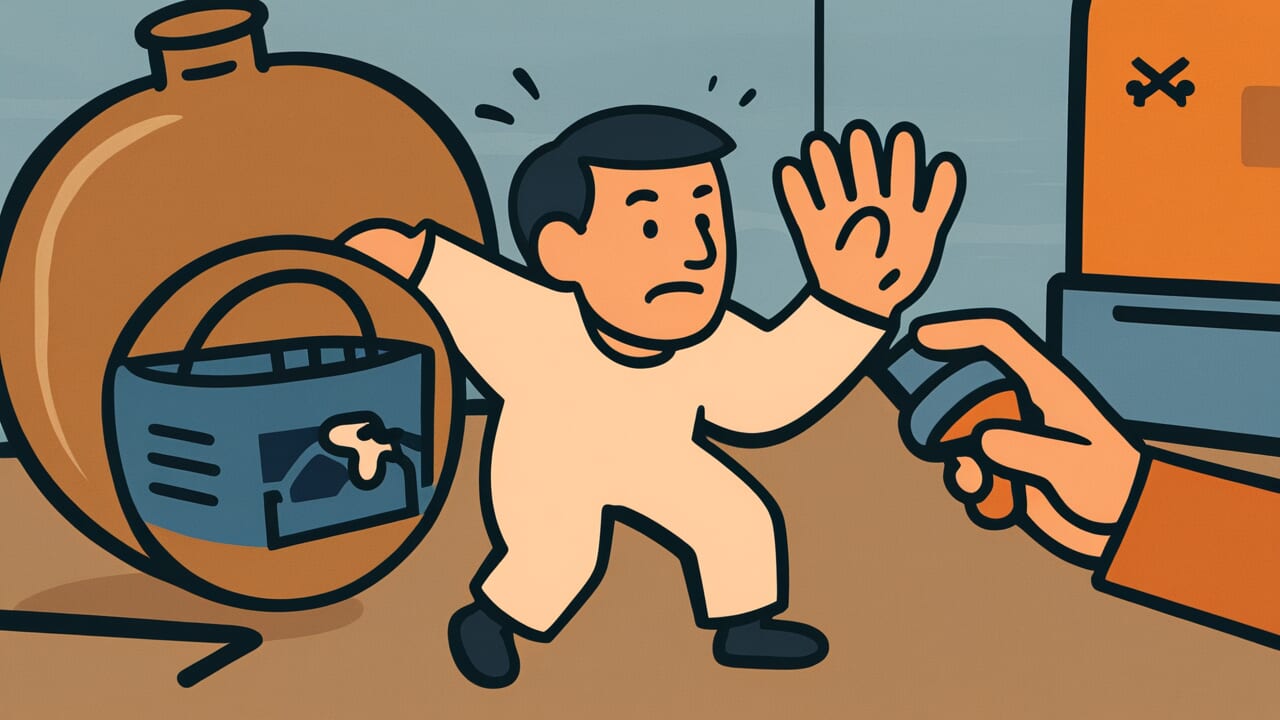How to Read “Hesitating to throw at a rat for fear of breaking the vessel”
Nezumi ni nagen to hosshite utsuwa wo imu
Meaning of “Hesitating to throw at a rat for fear of breaking the vessel”
This proverb warns against the foolishness of damaging something important while trying to avoid a small harm.
It describes a situation where someone wants to get rid of a rat, a small pest. But they fear breaking their precious dishes. So they end up leaving the rat alone.
People use this saying when someone gets so focused on avoiding a small loss that they lose sight of what really matters.
The image is clear: you worry so much about not breaking your dishes that the rat keeps eating your food. This backwards result perfectly shows how wrong priorities lead to foolish decisions.
Even today, people use this expression to criticize those who avoid dealing with real problems because they fear minor issues.
Origin and Etymology
This proverb likely comes from an ancient Chinese text called the Huainanzi. The original phrase appears as “hesitating to throw at a rat for fear of breaking the vessel.”
It describes someone who wants to get rid of a rat but fears damaging their precious pottery.
In ancient China, rats in the house were a daily problem. But if you threw things to chase them away, you might break expensive pottery or important vessels.
The situation became a classic example of backwards thinking. People feared breaking dishes so much that they left the rats alone.
The saying came to Japan through Chinese classical texts. It appears in educational books from the Edo period.
Japanese people of that time also knew rats as pests that destroyed grain. So this lesson felt very practical and real to them.
The proverb has been passed down for generations. It uses an everyday household scene to show how people make wrong judgments.
Usage Examples
- The company ignored problems because they feared complaints. They lost customer trust. That’s exactly like “Hesitating to throw at a rat for fear of breaking the vessel.”
- Refusing treatment because you worry about side effects is like “Hesitating to throw at a rat for fear of breaking the vessel.”
Universal Wisdom
This proverb has lasted so long because it touches a fundamental human weakness. We fear concrete losses right in front of us more than bigger future damage we can’t yet see.
We can imagine the sound of a dish breaking. But the harm a rat will cause in the future feels abstract and hard to grasp.
Humans instinctively try to avoid risk. But sometimes this avoidance behavior distorts our judgment.
We avoid small pain and turn away from big problems. This psychology hasn’t changed from ancient China to modern Japan. It’s part of human nature.
Looking deeper, this proverb deals with a universal theme: the fear of taking action. When you act to protect something, you always risk losing something else.
That fear paralyzes people. In the end, they can’t protect anything. Our ancestors understood this human weakness well.
The psychology of seeking perfection until you can’t do anything. The contradiction of losing what matters because you fear getting hurt. These are timeless parts of human nature.
When AI Hears This
This proverb shows what game theory calls “lack of commitment ability.” There’s a clear goal: eliminate the rat.
But the uncertainty that the vessel might break completely stops all action. This isn’t just indecisiveness. It’s a failure of decision-making under incomplete information.
What’s interesting is that two different types of loss exist here. One is “certain damage from the rat.” The other is “uncertain loss that the vessel might break.”
The human brain tends to overestimate uncertain losses compared to certain ones. Behavioral economics calls this “ambiguity aversion.”
People become extremely cautious about risks with unknown probability. For example, even if the chance of breaking the vessel is 30 percent, when you don’t know that number, you focus on the 30 percent failure possibility rather than the 70 percent success rate.
From a game theory perspective, “not acting” itself becomes a strategy. But the rat won’t wait. As time passes, damage accumulates.
Eventually you suffer losses greater than the vessel. So “doing nothing” is actually the worst strategy. But fear of uncertainty hides this fact.
This structure perfectly matches how companies decline when they can’t respond to market changes.
Lessons for Today
This proverb teaches modern people the importance of having courage to determine priorities clearly.
In your own life, are you so focused on avoiding small inconveniences that you hesitate to protect what truly matters?
In modern society, the fear of failure grows stronger and stronger. People can’t speak their minds because they fear criticism on social media.
They stay in unsatisfying jobs because they fear career change might fail. They can’t be honest because they want to avoid relationship troubles.
But if your fear of small wounds allows your whole life to be eaten away, isn’t that backwards?
What matters is making clear what you’ll give up to protect what. Living without any hurt is impossible.
So have the courage to accept small risks. Don’t fear breaking the vessel. Chase out the rat.
That decision is what will protect your life.



Comments